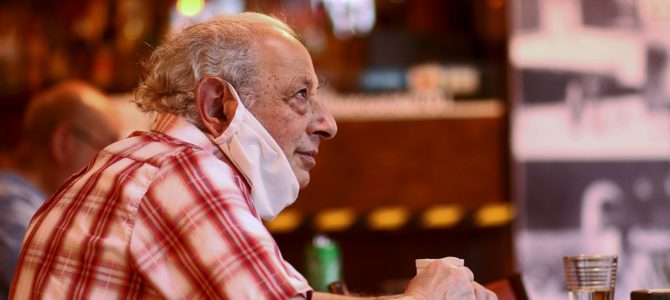
Amid the latest wave of COVID-19, those who believe in the necessity of lockdowns and masks are insisting the non-compliant minority is “the reason we can’t get back to normal.” That makes sense as long as you don’t take into account the history of COVID restrictions and their loose relationship with both the science and the metrics of the pandemic.
Most of the statewide mask mandates went into effect in the summer, for instance, when cases were at or near their lowest point. Teachers unions in major cities across the country fought reopening plans all through the summer, with Fairfax County, Va. teachers insisting on near-complete suppression of COVID’s local spread to reopen. The New York Times now insists, against available data, that even those who receive a highly effective vaccine for COVID-19 “still need to wear a mask.”
These restrictions and the attitude that drives them have little to do with the ever-shifting prevalence of COVID-19. We blame restrictions on the current COVID wave, or the threat of new waves, when what’s really happened is a paradigm shift in which normal behavior has been redefined as homicidally reckless.
Those who get COVID or accidentally spread it can be blamed and shamed and put on trial by the mob for “criminal” irresponsibility, even though the vast majority of those who contract the virus will recover. Not only is such a culture of fear and guilt crippling us socially, mentally, and economically, but it is keeping “normal” out of reach.
Just as COVID restrictions aren’t neatly tied to the virus’ spread due to this redefinition of social responsibility, neither will COVID restrictions be likely to fade away in proportion to declining infection rates. The uncomfortable truth is it doesn’t matter how many people get vaccinated or how few cases are reported each day; as long as people shame others and themselves for catching or unknowingly spreading COVID, “normal life” will have difficulty returning.
If a portion of the populace continues to live in fear that something they do might harm someone else, we’ll also face a long-term loss of liberty as we shift responsibility for our wellness, beyond COVID infections, from ourselves to other members of society and ultimately the government.
The problematic moral leap we’ve made regarding “protecting others” and “loving our neighbor” may not be immediately apparent, since currently we associate this rhetoric with the novel pandemic. But a simple thought experiment brings it to light.
Imagine if every bout of influenza, rotavirus, or pneumonia you ever had were tracked and traced the way health officials want to track COVID, capturing 100 percent of people you infected. You very likely could discover your infection “killed” someone somewhere down the line, maybe even several people.
The fear and guilt from realizing this would be petrifying. The process of informing close contacts you may have “exposed” would be utterly demoralizing. Under this mentality, how could those fortunate enough to be able to work from home and have groceries delivered possibly leave their houses with a clean conscience? And how could those who work outside the home avoid accumulating such heavy guilt?
Yet this is the view impressed upon us in the COVID era: if you dare violate any COVID edict, you may be a “grandma killer.” It paralyzes us with fear and sucks the joy out of life.
By contrast, the most workable understanding of responsibility, which we’ve mostly operated on until March of this year, is that an individual is responsible for his own welfare and any people under his care (i.e., his family). This encourages him to make more precise risk calculations based on unique individual circumstances instead of ham-handed government diktats, and frees him to go out and do things that directly benefit his family. If everyone is making their own risk calculations for themselves and their immediate loved ones, we don’t have to live in constant fear.
Within this framework, normal activities tend to bring a sense of fulfillment and joy instead of guilt and shame for unknown trouble we might have caused—things like going to work at a “non-essential” job to feed one’s family, gathering with believers to feed one’s soul, or simply giving a friend a much-needed embrace.
Try as we might to mitigate risks, bad things can and will happen. We have to choose how to deal with that: by living freely and without fear, or by letting fear pull us farther into dystopian social structures.
When responsibility is shifted to everyone else from vulnerable people and those who care for them directly, who can modify their behavior to mitigate real and present risks, it is ultimately the government who is held responsible for constraining their behavior. In Washington state, for example, residents aren’t allowed to have visitors over the holidays, churches aren’t allowed to sing together, dining in restaurants is prohibited, and people aren’t allowed to show their whole face in public indoor settings.
When COVID eventually fades from the headlines, this shift in responsibility could very well remain to constrain key liberties. We’ve already experienced a taste of it in recent years, as those on the left complain that some speech makes people feel “unsafe,” and that you are responsible for keeping them from feeling that way. We see signs of it in talk about “climate justice,” in which we’re all supposedly responsible for destroying the planet, leading to talk of emission-slashing lockdowns.
The morality employed during the pandemic could apply to many other things, from banning cigarettes and liquor, to forcing fast food restaurants to stop serving fattening foods and sugary sodas, to mandating a daily exercise regime a la “1984.” Think of all the lives we could save by “making some sacrifices,” right? If we want to “protect others,” then coercion from the state becomes a factor in nearly every aspect of life.
Normalcy doesn’t proceed naturally from the moral universe we’ve created over the past several months, even setting aside the heartbreaking destruction of jobs and businesses, the crushing blow to children’s welfare and academic success, and the deterioration of mental health the lockdowns caused.
We should appreciate the efforts of people who wear masks or stay home out of sincere concern for others, regardless of our convictions about such measures. We should love our neighbors and be considerate of their health.
At the same time, we must also return responsibility to individuals for their own wellbeing, understanding that sometimes tragedy strikes, and death and heartache are part of life. There is no “normal” until we do.









